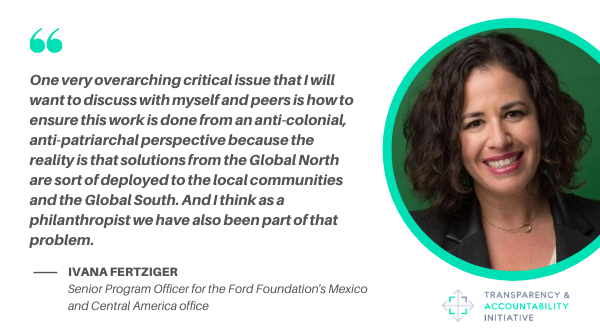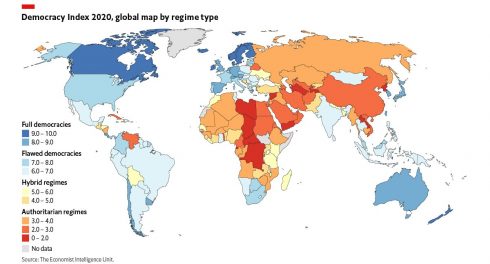Highlights
- Open inspiration?
- Corrupt by accident
- Digital shrinkage
- Standard deviation
- Greenwash no more
- Transparent motivations
- TAI Spotlight: Women of TPA
Open inspiration?

Image Credit: Radio social media
What do 189 articles on open government tell us? Kuang-Ting Tai read them for us to find no standard definition, more focus on transparency over participation or collaboration, and a lack of empirical evidence regarding the effects of open government.
Meanwhile, practice continues to evolve ahead of the literature. Given declining economic indicators in the Middle East and North Africa, the World Bank urges transparency on critical economic issues such as public debt and employment to drive growth and enhance trust in government. Tom Carothers and Frances Brown urge the U.S. government to shy away from any claims of American exceptionalism in shoring up democracy around the globe but emphasize “real partnering” and mutual learning. They cite the Open Government Partnership (OGP) as a model of peer-to-peer learning among governments and civil society groups about transparency and accountability reform. With that in mind, the Biden team might want to read Munyema Hasan’s reflections on what and how OGP is learning during the pandemic.
Want to get more involved? OGP has announced four steering committee seats open for civil society leaders to steer the global open government agenda in partnership with their government counterparts.
Corrupt by accident

The formal role for civil society in processes such as OGP would likely excite Sam Bbosa, who argues, “Good governance presupposes an active role by the citizens in the governance process and that public institutions ought to conduct public affairs in accordance with the aspirations of the citizens.” Read more in his blog – one of a series curated by Mo Ibrahim Foundation.
Germany is the latest country hit by a PPE procurement scandal – this time with MPs benefiting from awarded contracts. This is reviving debate on the need for a register of lobbyists and likely played a role in losses for the ruling Merkel coalition in regional elections.
Further east, the Russian parliament’s lower chamber has approved the first reading of a bill allowing officials to engage in “accidental” corruption. A special commission would investigate every corruption case to decide if a corrupt action was “accidental” and made during “uncontrollable circumstances”.
Nothing likely shocks the Global Initiative Against Transnational Organized Crime at this point – their new report documents how the global illicit economy has boomed in the past 20 years (a rising threat to security, development, and justice). For an even longer retrospective overview, checkout TRACE’s latest Global Enforcement Report, which provides direct data from 2020 and summarizes 44 years of anti-bribery enforcement activity.
Digital shrinkage
Machine learning may help target COVID response and social protections by identifying pockets of poverty in otherwise wealthy areas. ‘Poverty maps’ which use satellite imagery and AI shows how such innovation can be used to substantially identify poor households and extend social protection.
More worryingly on the tech front, the African Digital Rights Network looked at the connection between technology and the shrinking civic space in Africa and found twice as many examples of digital technology being used to close than open civic space in Nigeria. The team has shared lessons from ten African countries.
Matthew Lenares of Open Democracy is concerned that monetary systems are being reinvented in the digital space with little civic participation. He argues that citizens must be at the forefront of such change, and experiments such as paying for comments in digital spaces help us test what’s possible. The worry is that no government will have the technical prowess to decide what money system presides in the future, and public interests can be overridden.
Standard deviation
Ugandan eco-feminists are making history by fighting back against the oil-extractive industry, but investors may be one key to broader change. Holding the likes of Exxon Mobil in check requires industry-wide implementation of environmental, social, and governance (ESG) guidelines. A fascinating pilot study on ESG due diligence and transparency policies and practices among a sample of 25 companies in the extractives commodity trading sector offer some clues to what’s possible.
Meanwhile, James Cohen and Deniz Yaylaci worry about lack of ESG enforcement in Canada, especially in the mining sector, where they fear requirements are being weakened amid COVID, not strengthened. A new report covered by Nick McKenzie for PWYP also raised transparency and accountability concerns for investors, governments, and backers of the Bawdwin mine. The report shows links between Australian miner, Myanmar Metals and the Myanmar military.
In a more positive signal, the Biden administration reimposed sanctions on Israeli mining magnate, Dan Gertler, that had been lifted at the end of Donald Trump’s tenure. The sanctions relate to operations in the Democratic Republic of Congo – one country seeing increasing demand for specific minerals. The source of that demand? Electric vehicles. See what that demand looks like – much of it boosts sourcing from settings with weak governance.
Greenwash no more

Photo Credit: Michael Fornton/Flickr via Eco-business
Staying with corporate vigilance. Nearly half a million people have asked the European Union to introduce strong, enforceable corporate accountability laws that will ensure companies put people before profits. Arianne Griffith explains key issues raised and why it’s time for EU legislation on corporate accountability.
One area where the EU is advancing policy – the push to police ESG investments on sustainable finance and climate change. Attracta Mooney examines the upcoming sustainable finance disclosure regulations and its global implications, while Ian Mitchell and Matt Juden take a step back and highlight how little we know of the impact of climate finance that forms around a quarter of all international aid.
Similar transparency is necessary in Africa’s ongoing debt-for-climate swaps. While viewed as a positive step toward sustainable growth, economists warn that timing, and inclusion of all creditors will be needed for success. Such pressures are pushing the American oil industry to support a carbon tax instead of increased regulation, as Washington looks to reduce greenhouse gas emissions.
What motivate ESG investors? Let this visual explain.
Transparent motivations
A new report summarizes philanthropy’s historic response to COVID-19. It affirms shifts in grantmaking, e.g. providing unrestricted funds, more support to communities of color, and a trend to use philanthropic assets to work towards a decarbonized future and pushing their banks to do the same.
Turning to the leading case in point, environmental and philanthropy experts hope the Bezos Earth Fund’s hiring of an established nonprofit leader – Andrew Steer, head of World Resources Institute – as its President will bring a more coherent strategy and greater transparency to the little-understood $10 billion philanthropic organization that plans to spend all of that money by the end of the decade.
Finally, what of transparency of the groups foundations tend to fund? Nonprofits are tax-exempt organizations with missions of public social trust. Compliance with financial transparency and public accountability stipulations is a threshold requirement for nonprofits in many countries. Groups strive to meet relevant legal and financial frameworks, but how might nonprofits practice transparency toward their primary internal constituency — i.e., the staff who daily carry out their missions? Kori Kanayama explores 3 case studies of how nonprofits can harness transparency to serve staff.
Other stories:
- Anti-corruption toolkit for civic activist
- Journey toward racial equity – Baseline findings from the racial equity capacity assessment
- Navigating civic space in a time of COVID: One year on
Featured call: SPREAD THE NEWS – Help us advance the use of extractives data in Colombia!
Attention Colombia-based organizations working on accountability and/or participation in the mining sector! The International Finance Corporation and TAI want to hear from you. Please submit your ideas by March 31 to advance the use of extractives data on: mining royalties, gender inclusion, ethnic community participation, and/or the response and recovery to COVID-19.
TPA Full Disclosure: TPA Full Disclosure: Ivana Fertziger talk changes in grantmaking project delivery

At the Ford Foundation, Ivana Fertziger help to reduce poverty in rural areas and generates viable alternatives to migration by helping poor and marginalized households obtain financial, business development, and organizational development services. We spoke with Ivana on the principles around ensuring transparency and accountability in grantmaking process and project delivery. In sum, she says: “There is a lot of work to be done in this space.”
TAI Spotlight: Women of TPA
This week’s spotlight section is in honor and celebration of women’s history month and International Women’s Day
Women of TPA | Transparency and Accountability Initiative
Featured in our ongoing TPA Full Disclosure Series, meet some of the women who are scaling actionable impact around the transparency, participation, and accountability (TPA) grantmaking and practice: Alfonsina Peñaloza, Amina Salihu, Amira El-Sayed, Cheri-Leigh Erasmus, Isabelle Kermeen, Ivana Fertziger, Sarah Jane Staats, Teona Turashvili, Ximena Andión Ibañez, and Yvonne Darkwa-Poku.
Changing the game for women and girls | Ford Foundation
For nearly 60 years, the foundation has supported women and feminist-led efforts around the world. In the 2000’s, the Foundation expands its support to leaders and organization working to end child marriage. Learn more about the Foundation’s work in making equality possible.
Celebrating the women leaders we work with in Africa | Luminate
In commemoration of this year’s International Women’s Day, the Luminate Africa team celebrates the amazing women leaders in their portfolio who have demonstrated determination, skill, and empathy in building and leading organisations that make our societies more just and fair.
Light in the darkness: The feminist leaders revolutionizing democracy | Open Society Foundation
To celebrate Women’s Herstory Month, the Foundations’ Women’s Rights Program share stories of some of their women grantees who are helping to grow open societies through their vibrant and influential feminist movements.
Ten quotes from MacArthur fellows on International Women’s Day | MacArthur Foundation
The foundation share reflections from ten of their women fellow as a way to uplift their personal stories and aspirations, their collective challenges and triumphs, and shed light on their work to help make the world a better place.
Gender equality: Women, land, and data | Chandler Foundation
In over 30 countries, women and girls don’t have the same rights to own or inherit land as men and boys. And in dozens of others, customs undermine women’s rights to land and property. Chandler Foundation CEO, Tim Hanstad explains why we need gender-disaggregated land rights data that is people centered, actionable, and accessible.
Images of empowerment | Hewlett Foundation
Check out this free library of images produced by Hewlett Foundation in collaboration with Packard Foundation and Getty Images to celebrate women’s lives and their work in 11 countries around the world. The images are free for nonprofit use!
Job listings
- Policy and Projects Manager at ONE – Ongoing
- Senior Policy Advisor for Civic Space at Oxfam America – Ongoing
- Job postings at Hewlett Foundation – Ongoing
- Job postings at MacArthur Foundation – Ongoing
- Job postings at Open Society Foundations – Ongoing
- Job postings at Luminate – Ongoing
Job postings at Ford Foundation – Ongoing
Calls/Opportunities
- USAID Funding: Supporting transparency and accountability in Sudan – April 12, 2021
- West Africa Civil Society Institute (WACSI) call for papers and articles – Open year-round
- USAID’s Development Innovation Ventures (DIV) grant funding – Ongoing
- Call for research proposals Tax and civil society – No deadline
- Free Digital Security Training – Ongoing
- Call for proposals: Informality, tax, and the state – Proposals accepted on a rolling basis
Calendar
- Tracing funds from environmental crime – March 17, 2021 (7am EST / 1pm CET)
- Digital technologies and data as tools for transparency, integrity and reinforcement of trust between governments and citizens in LAC (in Spanish) – March 18, 2021
- World Bank civil society policy forum (Virtual) – March 22-April 11, 2021
- GI-ACE | Mainstreaming gender in anti-corruption research – Mar 23, 2021 10:00 AM (ET)
- How social sector organizations can design human connections in the digital age – March 24, 2021 (11 a.m.-12:30 p.m. PT / 2-3:30 p.m. ET)
- What are the key tools and approaches to build infrastructure back better? – March 25, 2021 (2-3.30pm GMT)
- Virtual convening of Frontiers of Social Innovation: “People, Power, Resources: Enacting an Equitable Future” – May 11-13, 2021
- Frontiers of Social Innovation – May 11-13, 2021
- Open Gov week (Virtual) – May 17-21, 2021


